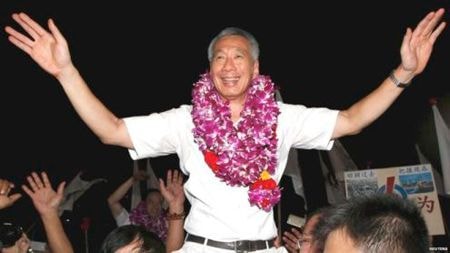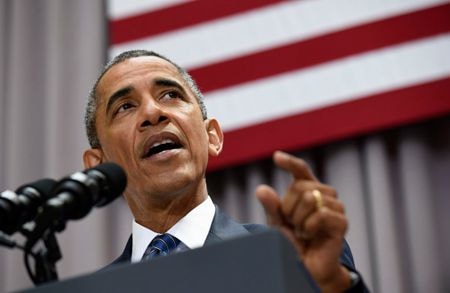Expected victories
(Baonghean)- Last week, the world witnessed the great victories of politicians, from the general election to the National Assembly of the Lion Island to the debates in the Parliament of the United States.
PAP's resounding victory in Singapore
The ruling party in the Lion Island, the People's Action Party, has just won a resounding victory in the 2015 general election for the country's parliament. According to the official results announced early in the morning of September 12, the People's Action Party (PAP) received about 70% of the votes, accounting for 83 out of 89 seats in the National Assembly, winning 15 out of 16 Group Representation Constituencies (GRCs) and 12 out of 13 Single-Member Constituencies (SMCs). With these telling numbers, it can be affirmed that the PAP - the party in power in Singapore since the island nation was founded 50 years ago, has had an overwhelming victory and will continue to be the ruling party for the next 5 years in the people's expectations.
 |
| Prime Minister Lee Hsien Loong and his team won 79% of the votes at Ang Mo Kio GRC. Photo: Internet |
Before the general election officially took place, most analysts had predicted that the PAP would almost certainly win. The sample vote count results announced on the night of September 11 also reinforced many people's predictions. This year is the first year that the Election Commission of Singapore has conducted a sample vote count, which means randomly taking 100 votes from each GRC and SMC, thereby helping voters know the preliminary results earlier, instead of having to wait as in previous elections. At the same time, the sample vote count also prevents speculation or misinformation from unofficial sources while the counting process is not yet complete.
Nevertheless, when the final results are announced, they will still be significant for the PAP, symbolizing the party's dramatic turnaround since the 2011 polls. At that time, the PAP only won 60.1% of the total votes nationwide, a record low for the party after half a decade in power. Prime Minister Lee Hsien Loong also won 79% of the votes in his constituency, Ang Mo Kio GRC, up from 69% in the last general election nearly five years ago.
Thus, with this not-so-surprising victory, the ruling party PAP in the island nation of Singapore has won the right to decide on the formation of a new government. In the context of the country facing difficulties as the economy shows signs of slowing down, in addition to issues of immigration, public transport, rising living standards... the result of the vote once again consolidates and strengthens the role and position of the ruling party as well as Prime Minister Lee Hsien Loong, as well as shows the support of the majority of Singaporeans for the ruling class.
Going forward, the government will continue to “move forward on a new path”, as Prime Minister Lee Hsien Loong affirmed, with a focus on social needs, especially for the elderly and the disabled, and with greater participation from the people. One thing is for sure, the people of this country will look forward and expect a lot from the leadership in their country, not only in the next 5 years, so that Singapore can continue to maintain and accelerate the strong growth momentum that has been there for a long time.
US President with the "greatest" diplomatic achievement
As predicted by experts and international public opinion, on September 11, the US House of Representatives, dominated by the Republican Party, passed a resolution rejecting the nuclear deal that the P5+1 group (including 6 powers: the US, UK, France, Russia, China and Germany) signed with Iran in mid-July. A day before, the Iran nuclear deal was considered to have scored the first "goal" in the "battle" in the US Senate. Despite the Republican Party's fierce efforts to derail the agreement, which was hailed as a "turning point" and "historic", the opposition to the Iran nuclear deal failed to muster the necessary 60 votes out of 100 to advance a resolution opposing the deal on the night of September 10.
 |
| President Obama has just recorded a rare victory on the foreign front during his 7 years in office. Photo: Internet |
Thus, Democratic lawmakers in the Senate successfully blocked the Republican resolution of rejection, so although the resolution of rejection of the agreement under which Iran limits its nuclear programs in exchange for the US and Western countries lifting sanctions imposed on the Islamic Republic, was unanimously passed by the US House of Representatives with 162 votes in favor compared to 269 votes against, President Barack Obama still basically won, successfully protecting the agreement he has long pursued.
In the context of Washington's political arena being more fiercely conflicted and divided than ever before, this information affirms Mr. Obama's rare achievement on the foreign front during his 7 years as head of state in this country. Indeed, after hours of tense negotiations, which at times seemed deadlocked, reaching an agreement like the one on July 14 in Vienna (Austria) was not an easy thing. For President Obama, after signing the agreement, protecting and promoting the agreement in the Washington Congress is the top priority and a huge challenge in his position as leader. Mr. Obama has actively lobbied lawmakers to support the historic nuclear agreement, and he has even pledged to use the President's veto if necessary to prevent the collapse of this agreement.
After the latest developments in recent days, it is clear that the US President has not fallen into the "dead end" of having to use his veto power to protect the Iran deal against the Republican rejection resolution. Set against the backdrop of such conflicting Washington politics, the victory of the outgoing president is even more highlighted. And although the opposition continues to affirm its firm stance of rejecting or delaying the implementation of the nuclear deal between Iran and P5+1, typically by passing a resolution to prevent President Obama from lifting or reducing economic sanctions on Iran until January 21, 2017, the time when Mr. Obama ends his second term and leaves office, many people still believe in the ability to realize the commitments made 2 months ago, as well as the ability to make "achievements" in the short time left in Mr. Obama's presidency.
Thu Giang
